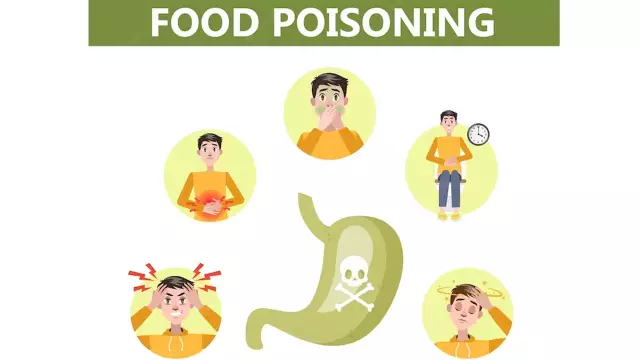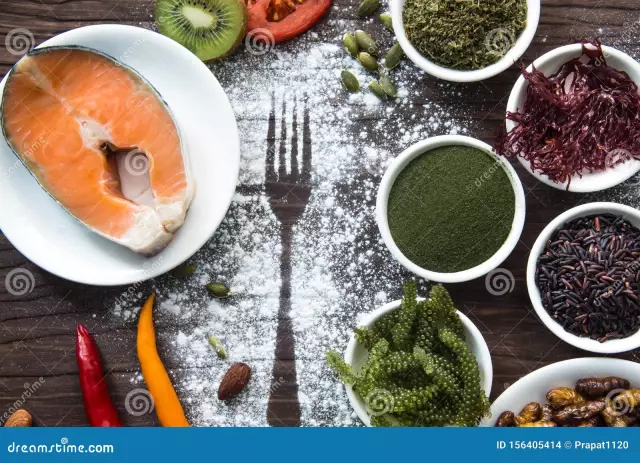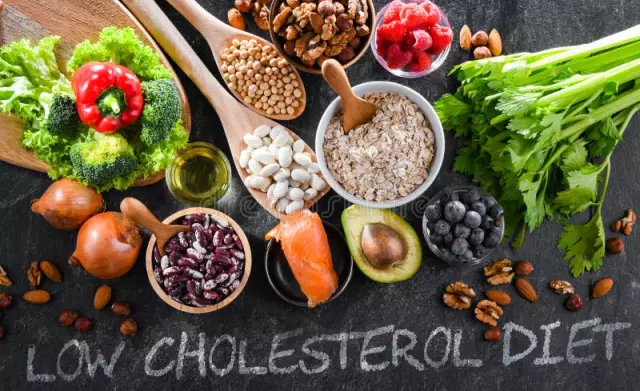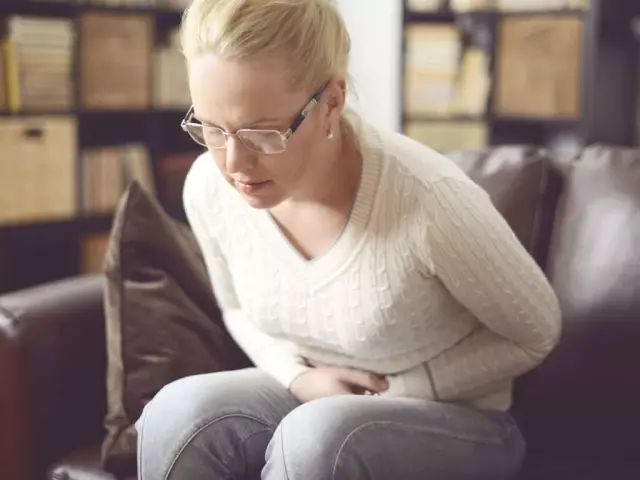- Author Rachel Wainwright [email protected].
- Public 2023-12-15 07:39.
- Last modified 2025-11-02 20:14.
Diet for poisoning

Poisoning is a violation of body functions due to the ingestion of poisons or poor-quality food into the body.
Causes of poisoning
Poisoning is a strong stress for the whole organism; all defenses are involved in the fight against their consequences.
A person can be poisoned by poisonous mushrooms or plants, alcohol, household chemicals or some kind of chemical substance, but food poisoning is the most common.
With food poisoning, poor-quality food enters the gastrointestinal tract - poorly fried meat or fish, raw eggs, sour dairy products. They may have been stored in improper conditions, or deteriorated from too long storage. Unwashed vegetables and fruits can also be a cause of discomfort. It is important to accurately and timely establish the cause of the poisoning so that other people do not suffer from the use of this spoiled food.
Poisoning symptoms
Poisoning proceeds with pronounced discomfort and impaired well-being. Most often, a person is worried about:
- Weakness, chills, and headaches;
- Pain and discomfort in the abdomen;
- Diarrhea;
- Nausea and vomiting;
- Increased body temperature.
With such symptoms, it would be most correct to seek medical help, since it is quite difficult to control this kind of lesion on your own. The doctor will be able to carry out differential diagnostics of poisoning and exclude intestinal infection or surgical pathology in the abdomen. Sometimes, treating food poisoning requires speeding up the elimination of toxic substances from the body using fluid therapy in a hospital setting.
When you can eat after poisoning
In treating food poisoning, the nature of the food is as important as the medication. Almost always, with food poisoning, a person has a reduced appetite, and he does not want to eat at all. A diet for food poisoning in the early stages just involves fasting for a certain period of time. This will protect the gastrointestinal tract from overload. On the first day of the diet in case of poisoning, food intake is not recommended at all, such fasting will only benefit the body. From the second day, when you feel better, you can start eating.
Drinking regime on a diet for poisoning
Drinking water on a diet for food poisoning is necessary as much as possible. In this condition, large quantities of fluid are lost with vomiting and diarrhea, and then at elevated temperatures. In addition, it is necessary to remove the toxins that caused the poisoning from the body, so the water load on the body must be large enough.
An adequate drinking regimen on a diet for mild and moderate poisoning can replace the infusion of medicinal solutions into the veins, but they cannot be done without them in case of severe poisoning.
As drinks, in addition to ordinary water on a diet in case of poisoning, you can use:
- Still mineral water;
- Dried fruits compote;
- Rosehip tea;
- Rice broth;
- Sugar-free black or green tea.
Drinking on a diet for food poisoning should be frequent and regular, but in small portions. Large amounts of water can provoke vomiting. With feces and vomit during food poisoning, a lot of salts are lost. Their deficiency can be filled with special rehydrating solutions:
- Regidron;
- Citroglucosolan;
- Glucosolan, etc.
They have a salty and not always pleasant taste. Powder for the preparation of such solutions can be purchased at the pharmacy and diluted according to the instructions. The therapeutic solution is recommended to be included in the diet for food poisoning on the first day, alternating with other liquids - compote, tea, water.
What can you eat on a diet for food poisoning
After poisoning, you should very carefully select dishes in your diet. For a long time, it is necessary to exclude from the list of permitted products:
- Fatty fish and meat;
- Semi-finished products;
- Ketchup and mayonnaise;
- Canned food;
- Spicy, smoked and salty dishes;
- Oil;
- Sweets and pastries;
- Carbonated drinks;
- Alcohol.

In order for the stomach to start assimilating food again, it must be easy to digest. First of all, on a diet in case of food poisoning, fatty and protein-rich dishes are excluded as requiring the greatest stress of digestive forces. For the same purpose, it is recommended to increase the number of meals to 6 - 7 per day, and reduce the portions of food in volume. Also in the first days it is undesirable to eat dairy and sour-milk dishes. Fresh vegetables and fruits should be replaced with boiled or baked ones.
Dishes that meet certain requirements are suitable for the category of allowed in the diet for poisoning. Food should be:
- Mechanically and chemically gentle;
- Optimum temperature;
- Do not provoke excessive stimulation of the digestive glands and enzymes;
- It is desirable to have enveloping properties;
- Do not ferment the intestines.
Dishes must be boiled or steamed. A weak meat or chicken broth is allowed as a first course. The bread should be wheat, but not fresh, but yesterday's baking. It would be even better to replace it with crackers. It is permissible to use a small amount of boiled lean meat in the form of mashed potatoes or steam cutlets, mashed potatoes without milk and butter.
The main dish on a diet for poisoning is porridge - oatmeal, buckwheat or rice. They are cooked without milk and are not seasoned with butter.
In case of poisoning, one should stay on such a diet for several days, expand the diet and introduce new products gradually, in small quantities.
Diet for poisoning in children
As soon as the baby has the first symptoms of poisoning, you need to begin to solder it with liquid. Portions of water, compote, tea and rice water should be small so as not to provoke vomiting. Sometimes in such cases it is required to give liquid every 15 minutes, several teaspoons. If the child does not want to eat, there is no need to force him.
Diet in case of poisoning in infants allows you to maintain breastfeeding, but it is better to remove complementary foods for a while. The general principles of selection of dishes for the menu correspond to those of adults.
Found a mistake in the text? Select it and press Ctrl + Enter.






